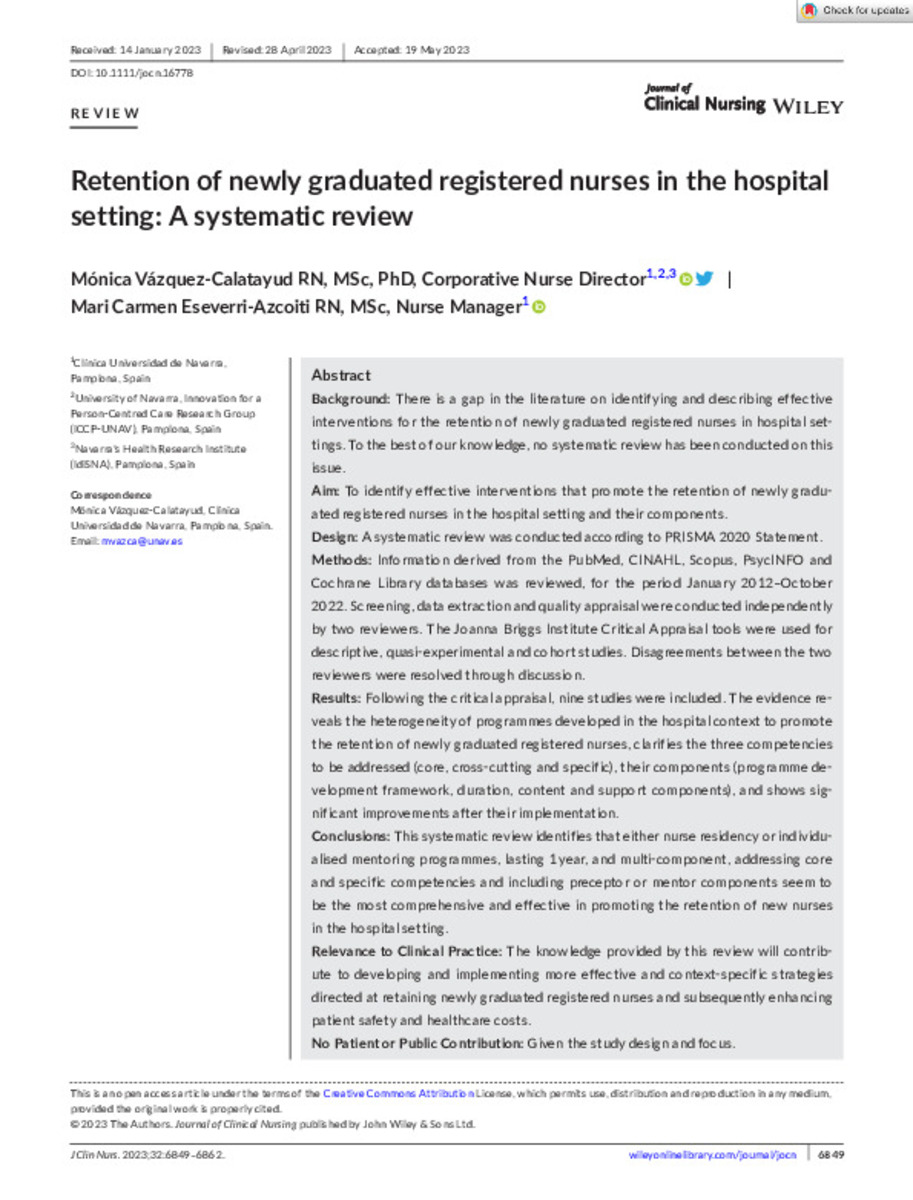Full metadata record
| DC Field | Value | Language |
|---|---|---|
| dc.creator | Vazquez-Calatayud, M. (Mónica) | - |
| dc.creator | Eseverri-Azcoiti, M.C. (Mari Carmen) | - |
| dc.date.accessioned | 2023-11-21T13:20:41Z | - |
| dc.date.available | 2023-11-21T13:20:41Z | - |
| dc.date.issued | 2023 | - |
| dc.identifier.citation | Vazquez-Calatayud, M. (Mónica); Eseverri-Azcoiti, M.C. (Mari Carmen). "Retention of newly graduated registered nurses in the hospital setting: A systematic review". Journal of Clinical Nursing. 32 (19-20), 2023, 6849 - 6862 | es_ES |
| dc.identifier.issn | 1365-2702 | - |
| dc.identifier.uri | https://hdl.handle.net/10171/67931 | - |
| dc.description.abstract | Background: There is a gap in the literature on identifying and describing effective interventions for the retention of newly graduated registered nurses in hospital set-tings. To the best of our knowledge, no systematic review has been conducted on this issue.Aim: To identify effective interventions that promote the retention of newly gradu-ated registered nurses in the hospital setting and their components.Design: A systematic review was conducted according to PRISMA 2020 Statement.Methods: Information derived from the PubMed, CINAHL, Scopus, PsycINFO and Cochrane Library databases was reviewed, for the period January 2012–October 2022. Screening, data extraction and quality appraisal were conducted independently by two reviewers. The Joanna Briggs Institute Critical Appraisal tools were used for descriptive, quasi-experimental and cohort studies. Disagreements between the two reviewers were resolved through discussion.Results: Following the critical appraisal, nine studies were included. The evidence re-veals the heterogeneity of programmes developed in the hospital context to promote the retention of newly graduated registered nurses, clarifies the three competencies to be addressed (core, cross-cutting and specific), their components (programme de-velopment framework, duration, content and support components), and shows sig-nificant improvements after their implementation.Conclusions: This systematic review identifies that either nurse residency or individu-alised mentoring programmes, lasting 1 year, and multi-component, addressing core and specific competencies and including preceptor or mentor components seem to be the most comprehensive and effective in promoting the retention of new nurses in the hospital setting.Relevance to Clinical Practice: The knowledge provided by this review will contrib-ute to developing and implementing more effective and context-specific strategies directed at retaining newly graduated registered nurses and subsequently enhancing patient safety and healthcare costs.No Patient or Public Contribution: Given the study design and focus. | es_ES |
| dc.language.iso | eng | es_ES |
| dc.publisher | Wiley | es_ES |
| dc.rights | info:eu-repo/semantics/openAccess | es_ES |
| dc.subject | Intervention | es_ES |
| dc.subject | Nursing | es_ES |
| dc.subject | Personnel turnover | es_ES |
| dc.subject | Review literature | es_ES |
| dc.title | Retention of newly graduated registered nurses in the hospital setting: A systematic review | es_ES |
| dc.type | info:eu-repo/semantics/article | es_ES |
| dc.description.note | This is an open access article under the terms of the Creative Commons Attribution License | es_ES |
| dc.identifier.doi | 10.1111/jocn.16778 | - |
| dadun.citation.endingPage | 6862 | es_ES |
| dadun.citation.number | 19-20 | es_ES |
| dadun.citation.publicationName | Journal of Clinical Nursing | es_ES |
| dadun.citation.startingPage | 6849 | es_ES |
| dadun.citation.volume | 32 | es_ES |
| dc.identifier.pmid | 37283198 | - |
Files in This Item:
Statistics and impact
Items in Dadun are protected by copyright, with all rights reserved, unless otherwise indicated.






